It’s a beautiful Thursday evening in the San Gabriel Valley—which these days means the sun is out, the air is cool, and there isn’t an ICE raid in sight. I’m in Hacienda Heights, on my way to La Puente, when I spot a flower vendor on the corner of a major intersection.
In the past, I wouldn't think twice about this occurrence unless it was a holiday or I happened to be bumping Chalino’s El Navegante, the Sinaloan singer’s ballad about falling in love with a flower vendor. But these days, seeing a street vendor elicits a complex range of emotions: joy, fear, nostalgia, empathy.
It’s almost like I am Chalino searching helplessly for my long-lost love… except my long-lost love is a sense of normalcy and peace in the beautiful sprawling metropolis that people in my lifetime call L.A., but in my ancestors’ lifetimes, was known first as Yaanga, and later El Pueblo de Nuestra Señora la Reina de los Ángeles del Río de Porciúncula.
I stop at the red light and talk to the vendor—let’s call him Jeff to protect his anonymity and dispel any prejudices about what a Latino name should be. Jeff tells me he’s out there because he has to work. Jeff actually works for a guy who he seems to be a little afraid of, refusing to tell me a name or any other details.
“I only make three dollars for every bushel of roses and four bucks for each sack of oranges I sell,” Jeff says.
Learning that there is a big machine behind the flower and orange vendors who pop up all over Southern California highways is not shocking to me but it was the first of many revelations about the street vendor life I was about to encounter.
“It’s so slow right now,” Jeff pleads with me. “I barely have anything to eat.”
The light changes. I hand him all the cash I have on me. He insists I take some oranges. I do. I have to go. I’m late … for my first ever night working as a street vendor.
The Street Vendor Life: Hot Dogs, Hustle, and the Art of the Pitch
I arrived at the recently opened, Nogales High School-based night market Noble Nite Bites about 30 minutes after it opened. Like I said, I’m late but I come with reinforcements: my wife Megan, who is great at almost everything she does, and my father-in-law, Vince, who—spoiler alert—will mostly eat burritos and drink café de olla all night.
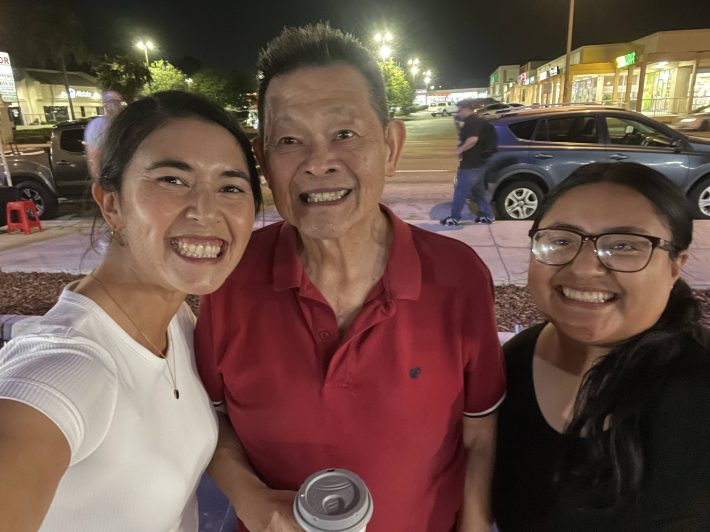
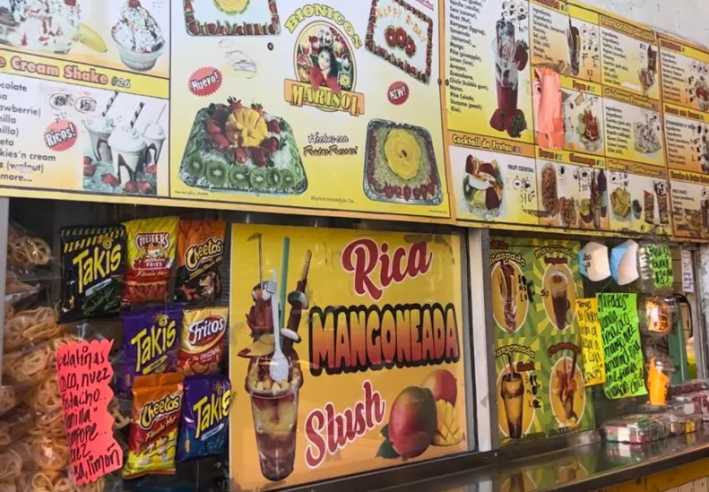
By the time we get there, Marisol Pulido of Bionicos Marisol, our five-foot boss for the night, has already set up a giant tent, three tables, two ice chests, and three cooking stations: one for roasting bacon-wrapped hot dogs, another for sautéing esquite, and a large station for dicing fruit for Bionicos Marisol’s specialty: sweet fruit salad creations.
“I started working in my parents' shop when I was very little,” she tells me. “I feel like I mastered it at this point.”
After spending a night working with her, I can confirm she has definitely mastered the craft of street vending, even though this is not what Marisol was doing for a living just three weeks ago.
You wouldn’t be able to tell this is only her third time at Noble Nite Bites. She knows which vendor has great chicken teriyaki, the best place to get cafe de olla, where to find smash burgers, and is personal friends with a guy who makes killer Philly cheesesteaks. Of course, all these places are run by young Latinos and Latinas.

I learn all this as I’m roasting L.A. dogs—thick, bacon-wrapped hot dogs covered in grilled onions and peppers—on a stainless steel griddle over a tiny propane-powered open flame. Marisol likes to dice up fresh onions and roast them every once in a while.
“The smell attracts customers,” she explains.
That’s another lesson about street vending that seems obvious now: that smell making your mouth water as you approach a puesto is most likely just grilled onions.
Her technique works. Before long, I go from debating if I should eat a hot dog to rushing to meet the demand of people buying them. Here’s another lesson: people will surprise you in how they like their hot dogs prepared.
“I’ll take one with everything you got,” a very small boy tells me.
Boom. I give him one covered in grilled onions and peppers, mayo, mustard, ketchup, relish, and a hot serrano pepper.
A giant-looking man with tattoos orders one “plain with lots of ketchup.” It turns out, you can’t guess people’s order based on their vibe.
Cooking and preparing the hot dogs for paying customers is a bit stressful. I’ve worked in restaurants before, mostly as a line cook, dishwasher, and busboy. But street vendors have to be all of that at the same time while doing it live for the person ordering the food. It’s like going to dinner and a show, but you’re the show. Here’s another thing I learned: street vending—especially when there’s a lot of competition like at a night market or food court—is so much about being a good sales person.
“I’m going to sell some banana pudding now,” Marisol tells me after an hour or so.
I guess at this point she’s confident Megan and I can handle the hot dog station on our own. I’m not quite sure what she means until I see her preparing a gorgeous, massive cup of sliced bananas, vanilla cookie crumble, sweet and condensed milk, and a special ingredient that’s Bionicos Marisol’s secret.
Then she makes two more for a total of three banana puddings. One is for display purposes. The other is divided up into small cups to be given away as free samples. And the third one is to walk around the night market to reel in curious customers who wonder, “Where did you get that?”
Like I said, Marisol is an expert at this. But even though it’s named after her, running Bionicos Marisol was not supposed to be directly in her career path.
Thank You, Gen Z: A Family Business Meets a Harsh Reality
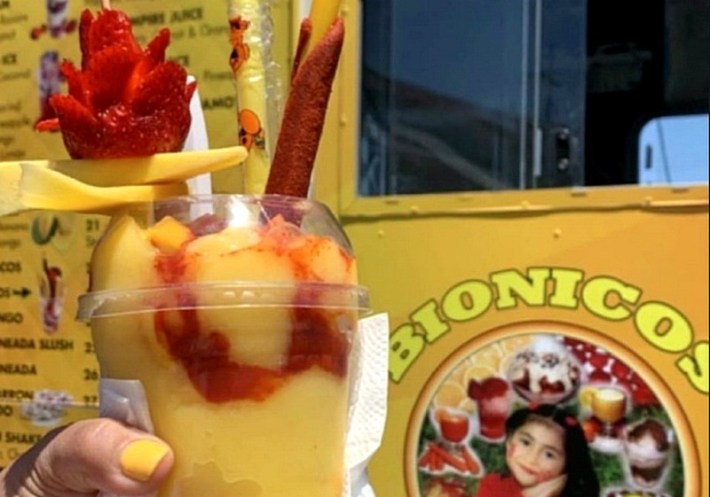
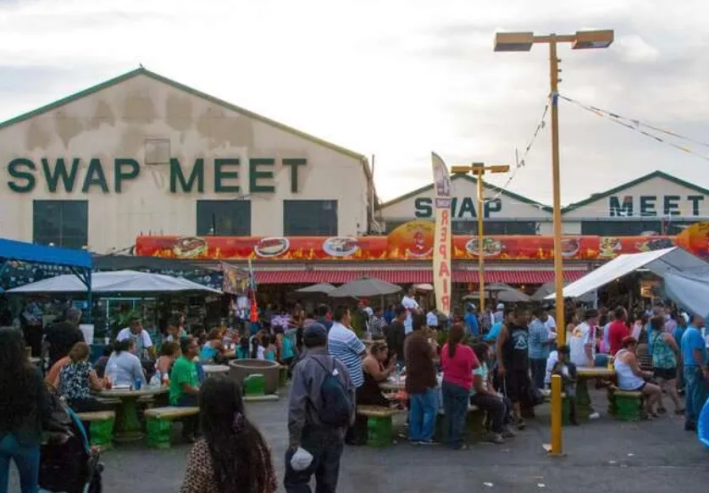
Bionicos Marisol originally opened in 1999 selling strawberries and cream at L.A.’s iconic indoor flea market, The Alameda Swap Meet. The shop was opened by her immigrant parents, Elvira and Eduardo, when Marisol was just a little Gen-Z baby.
As the market thrived, Bionicos Marisol thrived. The Pulidos were able to live their American Dream—buying a home, sending their kids to college, and expanding their business into catering private events and doing pop-ups. Marisol was working at a hospital up until a few weeks ago, when ICE hit Los Angeles and began to indiscriminately detain and arrest seemingly anyone who looked like an immigrant.
“Swap meets are getting raided left and right,” Marisol explains. “It’s chaos. Everyone is afraid.”
According to Marisol, her parent’s employees—and dozens of employees at the Alameda Swap Meet’s various shops—all stopped coming to work. Then the customers stopped, too. So Marisol did what she always does when her parents need her, she dropped everything and rushed to their aid.
“I had to resign my job to help my parents full time,” she tells me in between hawking a delicious strawberry bionico. “But it’s okay. I’m still young. I can afford to do this right now.”
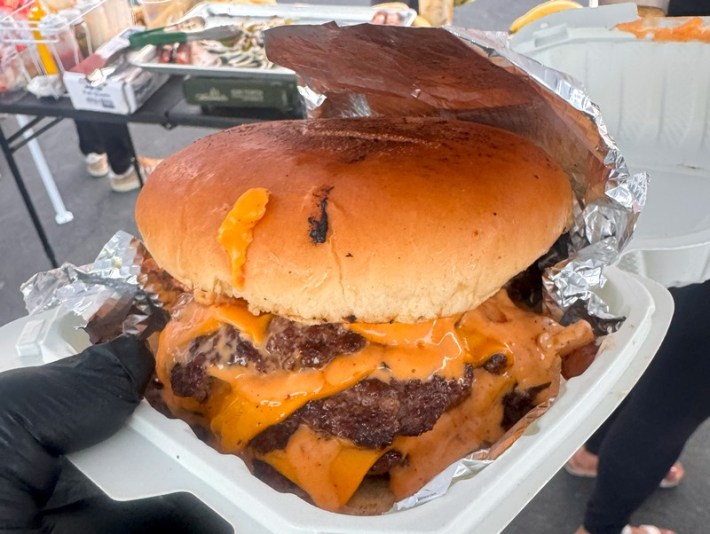
According to Marisol, most of the vendors at the Alameda Swap Meet are now just young kids working because their parents are afraid to or because the regular employees are. And with customers few and far between, the family is relying on the pop-up side of the business to keep things afloat.
“This is my third night in a row doing a night market,” she explains. “I’m tired but it’s been kind of fun, too. I get to meet new people and make friends with the other street vendors.”
At the end of the night, as we are breaking down the booth, Marisol teaches me one more lesson about being a street vendor at a bustling night market.
“Mija, I’ll take an esquite before you close,” says a woman selling spiral potatoes on a stick.
Marisol asks me if we have any left. I had one more that I was hoping to take home, but I say yes.
“How much do I owe you?” the woman asks Marisol.
“Nothing,” Marisol says. “I’ll trade you for one of those spiral potatoes.”
The woman agrees and throws in a couple of plates of tacos in street vendor solidarity.
That night, as I’m driving home, I wonder where the flower vendor I saw earlier is.
“I really hope he got home safely,” I tell my wife.
But now I feel something new, less complex: just a ton of respect.







